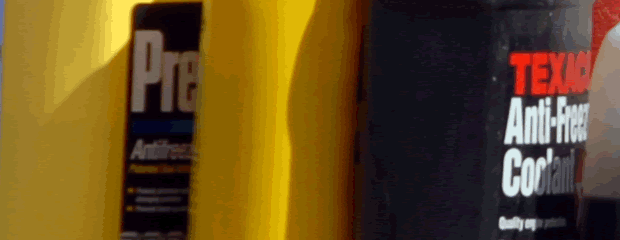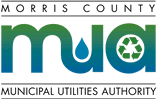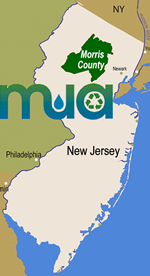Transfer Station Info (Tip Fee $113.00/ton)
- Mt. Olive Mon-Fri 7:30am-3pm; Sat 7:30am-11am
- Parsippany Mon-Fri 7am-3pm; Sat 7:30am-11am
- No Rental Trucks
- Payment by Account, Check, Credit Card. No Cash

F.A.Q. Antifreeze
The MCMUA operates one of NJ's most comprehensive household hazardous waste (HHW) programs. This F.A.Q. page and information on hazardous materials is intended as a guide about HHW materials as well as the MCMUA's HHW program. This information is a general guide and does not constitute official rule, regulation or law.
Hazardous Waste Materials
- Adhesives
- Aerosols
- Antifreeze
- Appliances (CFCs)
- Art & Crafts
- Asbestos
- Batteries (Auto & Boat)
- Batteries, Household (dry cell)
- Cell Phones
- Compressed Gas Cylinders
- Driveway Sealer
- Electronics
- Fire Extinguishers
- Fluorescents
- Gasoline
- Medical Waste
- Kerosene
- Mercury
- Motor Oil & Filters
- Muriatic Acid (HCl)
- Paints & Stains
- Pesticides
- Photo Chemicals
- Pool Chemicals
- Propane
- Rock Salt
- Smoke Detectors
- Solvents
- Wood with Lead Paint
Hazards
- Toxic to small children and may be deadly to animals attracted by its sweet taste.
- Spent antifreeze may contain metals from the engine (lead, zinc, copper).
-
Can disturb the biological action of sewage treatment and septic systems.
Handling
- Collect and store spent antifreeze in sealed, labeled, plastic or metal container, away from heat sources, children and pets.
- Never store in a beverage container; original container is best.
- Clean up spills with absorbent (kitty litter, shredded newspaper, vermiculite, rags, etc.); bag waste materials and discard in the trash. Flush soiled area with water.
- Do not mix with oil.
- Do not dispose down the drain or in storm drains.
-
Do not dispose of in the trash: liquid wastes can leak in a trash truck.
MCMUA's Facility Database
- Facilities that Accept Antifreeze
- Solid Waste Facilities (All Types)
- Class "D" Recycling Facility (Special Waste)
- Hazardous Waste Facilities
Management Options
- Unused Antifreeze - Antifreeze does not go bad. Donate to a friend who can use it, a mechanic or school auto shop.
-
Spent Antifreeze
- Take to community recycling center, if available. A state contract for antifreeze collection is available for municipalities and public sector agencies
- Take to service station or repair garage that accepts spent antifreeze.
- If recycling option is not available, take to next household hazardous waste collection day or a commercial hazardous waste facility.
-
Note: More environmentally-friendly propylene glycol may contain the same pollutants after use and should be disposed as suggested above.
-
Empty Containers - Dispose of these in the trash.


